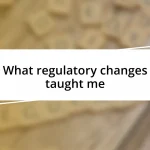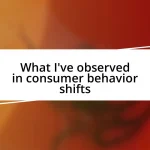Key takeaways:
- Understanding emotions like fear and greed is crucial for improving trading decisions and managing psychological triggers.
- Building a resilient mindset involves patience, self-awareness, and accountability, as well as adapting to challenges through feedback and support.
- Consistent reflection and documentation of trading experiences help identify patterns, learn from mistakes, and enhance overall trading strategies.
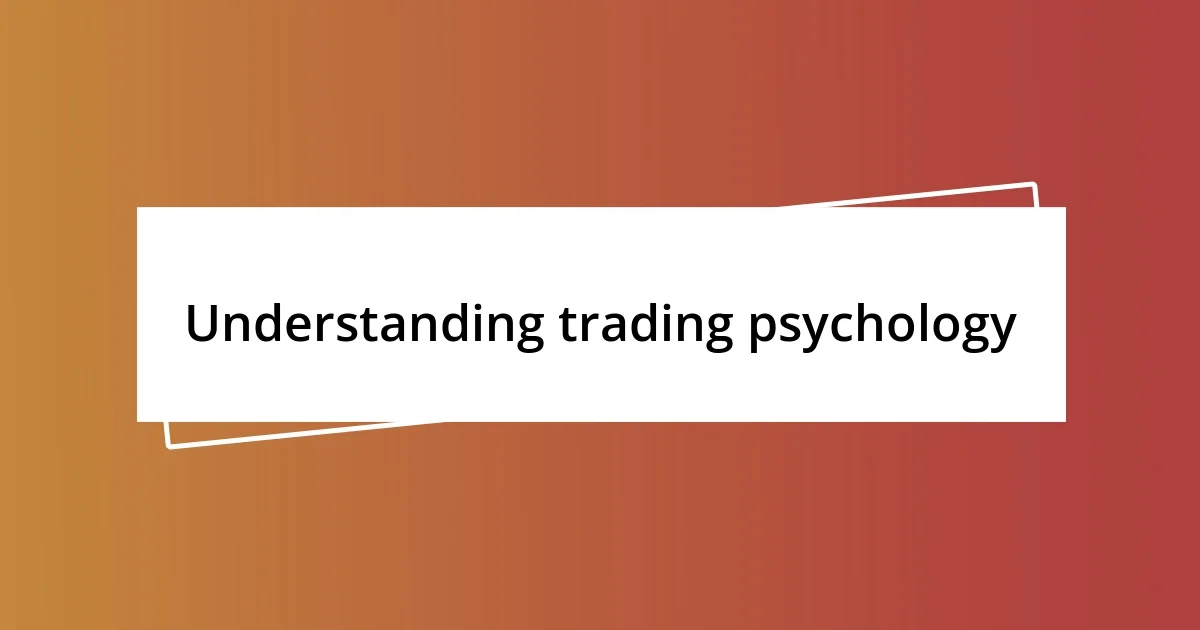
Understanding trading psychology
Trading psychology is often the unseen force that shapes our decisions in the market. I remember the first time I made a hasty trade based on fear rather than analysis; it taught me how emotions could cloud judgment. Have you ever made a snap decision in the heat of a market fluctuation?
Understanding our emotions—fear, greed, and even excitement—can illuminate the path to becoming a better trader. For instance, I’ve felt that rush of adrenaline when prices soared, only to watch them plummet moments later. It’s a real rollercoaster ride that can lead to regrettable choices if we don’t learn to manage our emotional responses effectively.
When we engage with our psychological triggers, we can start to identify patterns in our behavior. One time, after reflecting on a series of losses, I realized I was often holding onto losing trades out of stubbornness. This insight was pivotal; it made me question why I was so attached to my decisions, ultimately leading me toward healthier, more disciplined trading habits. What about you? Have you discovered any surprising patterns in your own trading behaviors?
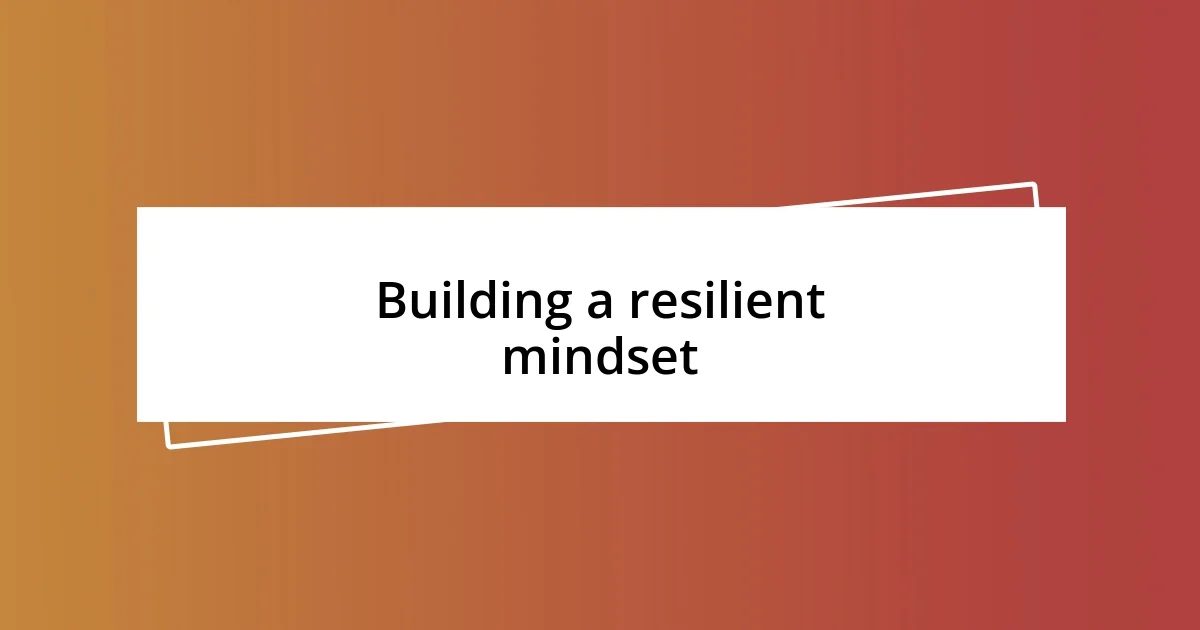
Building a resilient mindset
Building a resilient mindset is essential for any trader looking to navigate the emotional ups and downs of the market. In my experience, resilience isn’t just about bouncing back from losses; it’s about maintaining a level-headed approach even when things go awry. One particular trade sticks out in my mind: I had set clear targets, but when the market turned against me, I panicked. Instead of sticking to my strategy, I let anxiety dictate my actions, leading to a rash decision. That moment taught me that staying calm and adhering to my plan is vital to resilience.
Developing a resilient mindset involves cultivating patience and self-awareness. I remember a period where I faced recurring losses; it felt like a hit to my confidence. Instead of wallowing in defeat, I started journaling my trades—not just the wins, but the thought process behind each decision. Reflecting on my actions helped me see that trading isn’t just about the final outcome—it’s about understanding my reasoning and emotions along the way, reinforcing my resolve to improve without being overly critical of myself. Have you ever tried journaling your trades to track your emotional state?
Resilience also means adapting to change without losing sight of your long-term goals. I often remind myself that every trader faces setbacks, but it’s how we respond that defines our success. One of my most successful periods came after a significant loss; instead of retreating, I sought feedback from a mentor. This interaction provided clarity and improved my approach, demonstrating that resilience is often forged through collaboration and support. How do you tackle challenges in your trading journey?
| Traits of a Resilient Trader | Comparison with an Inflexible Trader |
|---|---|
| Adaptability | Sticks to one strategy regardless of market changes |
| Self-awareness | Ignores personal emotional triggers |
| Patience | Acts impulsively under pressure |
| Learning from mistakes | Blames external factors for losses |
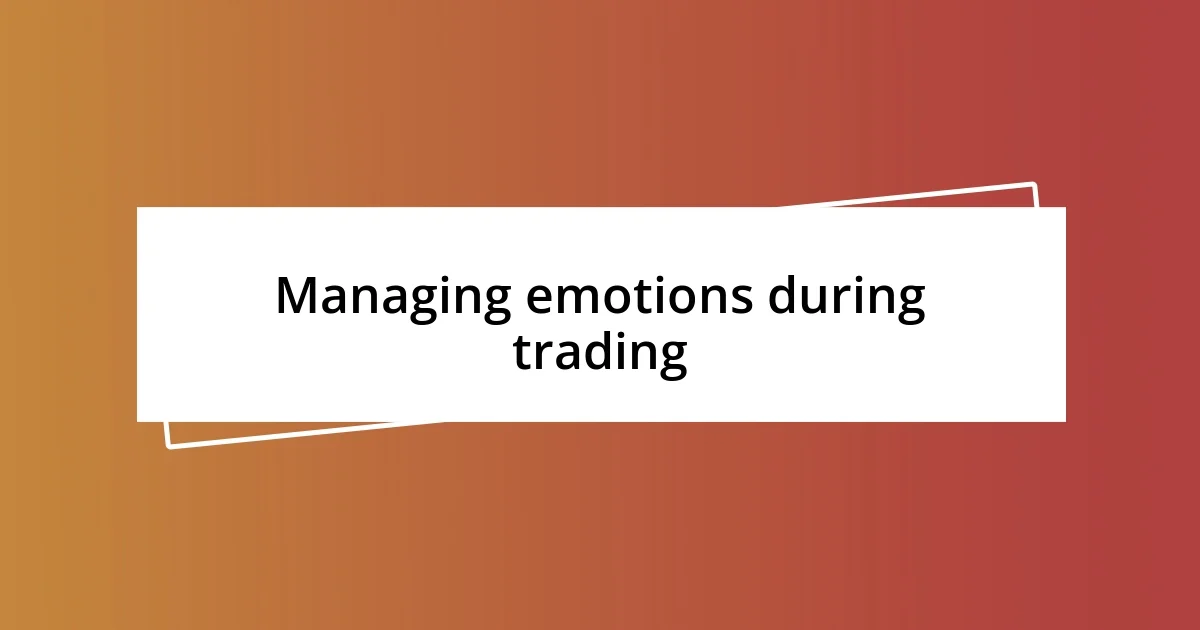
Managing emotions during trading
Managing emotions during trading requires consistent self-awareness and a proactive approach. I’ve found that setting predetermined rules for when to buy or sell can significantly help me keep my emotions in check. I remember one particularly volatile day when I desperately wanted to jump at a price drop out of sheer panic. By sticking to my trading strategy, I avoided making a rash decision that could have led to deeper losses. It’s a reminder that having a plan keeps emotional turmoil at bay.
Here are some practical tips that have helped me on my journey:
- Recognize Emotional States: Take a moment to acknowledge what you’re feeling and how it might affect your decisions.
- Use a Trading Journal: Document your trades along with the emotional state during the trade. It’s enlightening to see the correlation between emotions and outcomes.
- Set Stop-Loss Orders: These can act as a cushion against emotional reactions; they provide a clear exit strategy that isn’t driven by fear.
- Practice Mindfulness: Techniques such as meditation or deep breathing can help calm the mind, allowing for clearer decision-making.
- Limit Screen Time: Sometimes, stepping away from the charts can help to refocus and reduce anxiety. A short break can work wonders.
Managing emotions is a constant process, but employing these strategies can empower traders to make more rational, informed decisions rather than succumbing to fleeting feelings.
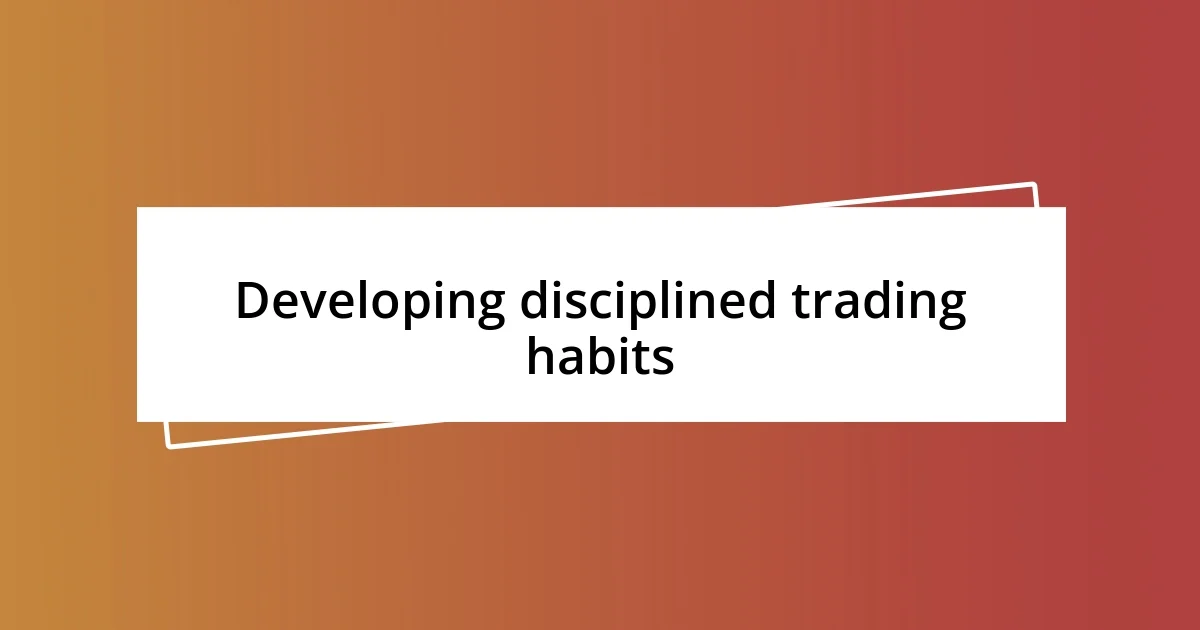
Developing disciplined trading habits
Developing disciplined trading habits is something I’ve had to work on consistently. Early on, I noticed that my trading was often chaotic. There were times when I impulsively jumped into trades without proper analysis, which ended up costing me dearly. To combat this, I began creating a daily checklist of things to do before I entered any trade—reviewing my strategy, setting my goals, and assessing the market conditions. This simple ritual brought structure to my process and significantly reduced the emotional rollercoaster I used to experience.
One of the techniques I found particularly helpful was the practice of visualization. Before I start my trading day, I take a moment to visualize my desired outcomes, not just focusing on profits but on how I will respond to various market scenarios. For instance, I imagine myself facing a sudden market drop. Instead of panicking, I visualize sticking to my trading plan, executing my stop-loss, and maintaining my composure. This mental rehearsal has made a difference in how I handle unexpected situations. Have you tried visualizing your responses and strategies before you trade?
Finally, accountability plays a significant role in developing discipline. I formed a small group of trading buddies with whom I share my goals and progress. Regular check-ins help keep me honest about my trading habits. I remember a particularly challenging month where I hesitated to share my losses, fearing judgment. But when I finally opened up, I received valuable feedback and support that motivated me to stay disciplined. This experience reinforced the idea that having a support system can keep you grounded and focused on your trading journey. Who do you lean on for accountability in your trading?
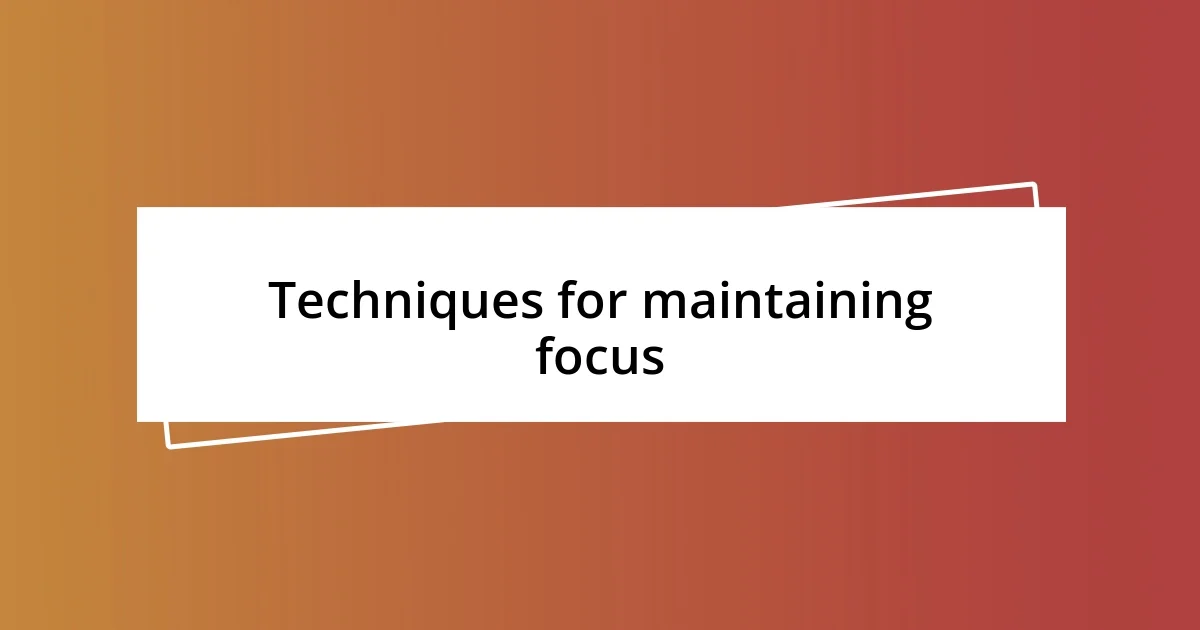
Techniques for maintaining focus
Maintaining focus while trading can often feel like an uphill battle. One technique I’ve found invaluable is to establish set trading hours. By defining specific times to focus on the markets, I avoid the temptation to dive into trades at all hours. I remember a time when I traded late into the night, and my focus waned as fatigue set in. It led to hasty decisions that I regretted the next day. Setting clear boundaries can keep distractions—and potential mistakes—at bay.
Another method that keeps me grounded is the use of short mental breaks during trading sessions. After intense periods of analysis, I step away for a few minutes, allowing my mind to reset. I often take a moment to stretch or grab a glass of water. It’s during these quick breaks that I find I can return with renewed clarity, making my decision-making process more efficient. Have you tried breaking up long sessions to maintain your focus?
Lastly, I’ve discovered that creating a focused workspace significantly impacts my trading concentration. I make sure my desk is clutter-free and equipped only with what I need for trading. When I look back on my experiences in a more chaotic environment, such as when I had multiple screens and distractions around me, it’s clear that a simplified setting brought better results. It’s amazing how a well-organized space can influence your mindset and keep you in the zone. What changes can you make to create a more focused trading environment?
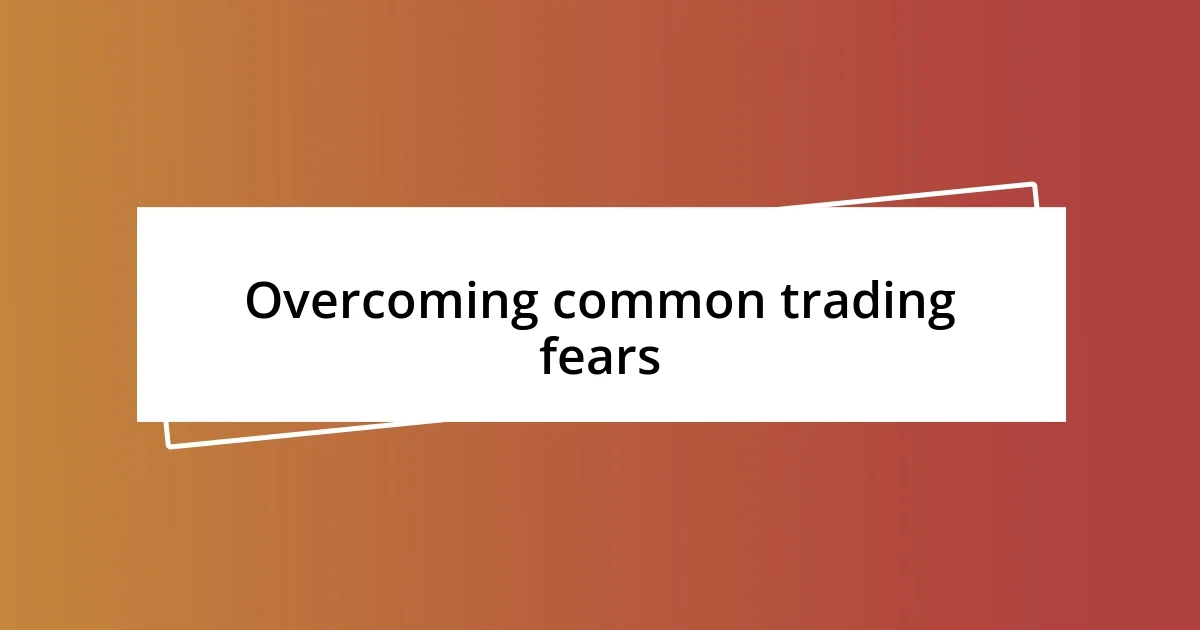
Overcoming common trading fears
Overcoming the common fear of missing out (FOMO) in trading is something I’ve grappled with time and again. I vividly remember watching a stock surge just after I had sold. The nagging feeling that I could have profited more gnawed at my confidence. To manage this, I started to remind myself that my trading strategy is not just about that one moment; it’s a long-term game. I also began to respect my decisions and trust my process. Have you ever felt that rush of anxiety when you see others winning big and wonder if you could have or should have acted differently?
Another fear that often creeps in is the fear of losing money, which I think is pretty universal among traders. I recall a particularly tough week when I faced consecutive losses that shook my confidence. Instead of wallowing in self-doubt, I initiated a practice of reflecting on my trades. I started asking myself what I had learned from each loss. This shift transformed my perception of losses into valuable lessons rather than just dollar signs slipping away. How do you convert your losses into learning opportunities?
Finally, the fear of making the wrong decision can be paralyzing. I’ve been in situations where analyzing data left me so overwhelmed that I simply froze, unable to act. To combat this, I developed a “go-to response” for when uncertainty hits. This involves stepping back and reviewing my trading plan, focusing on the reasons behind my preferred trades rather than the emotions diving in. I often ask myself, “What would I advise a friend to do in my position?” This perspective allows me to break free from indecision and trust my knowledge. Have you found a way to regain composure when facing difficult trading choices?
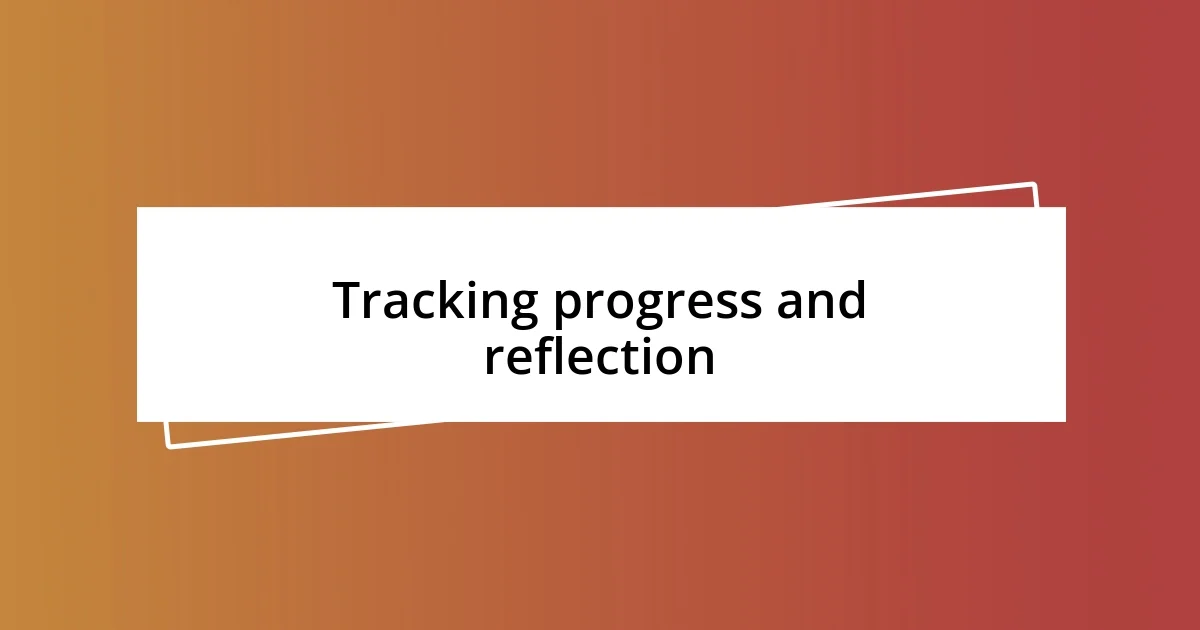
Tracking progress and reflection
Reflecting on my trading journey, I’ve realized how crucial it is to track my progress consistently. After every trading week, I sit down with my trading journal, where I not only record my trades but also how I felt during those moments. One time, I was surprised to see how my emotions swayed my decisions, especially on days when I felt particularly stressed. Have you ever noticed how your mood influences your trading outcomes?
Analyzing my recorded trades has led me to some enlightening realizations. For instance, I found patterns in my decision-making process, identifying strengths and areas to improve. During a particularly successful streak, I remember feeling confident and joyfully engaging with my strategies, while a series of losses brought self-doubt that clouded my judgment. By reflecting on these experiences, I learned the importance of emotional resilience. How often do you take time to dig into your own trading history?
Ultimately, I believe sharing my progress with fellow traders has been incredibly beneficial. Discussing my insights in a trading group not only holds me accountable but also opens the door to collective learning. I was once in a session where one trader shared their struggle with risk management, and it sparked a discussion that helped me refine my own approach. Have you tapped into the power of community to enhance your self-reflection journey in trading?











